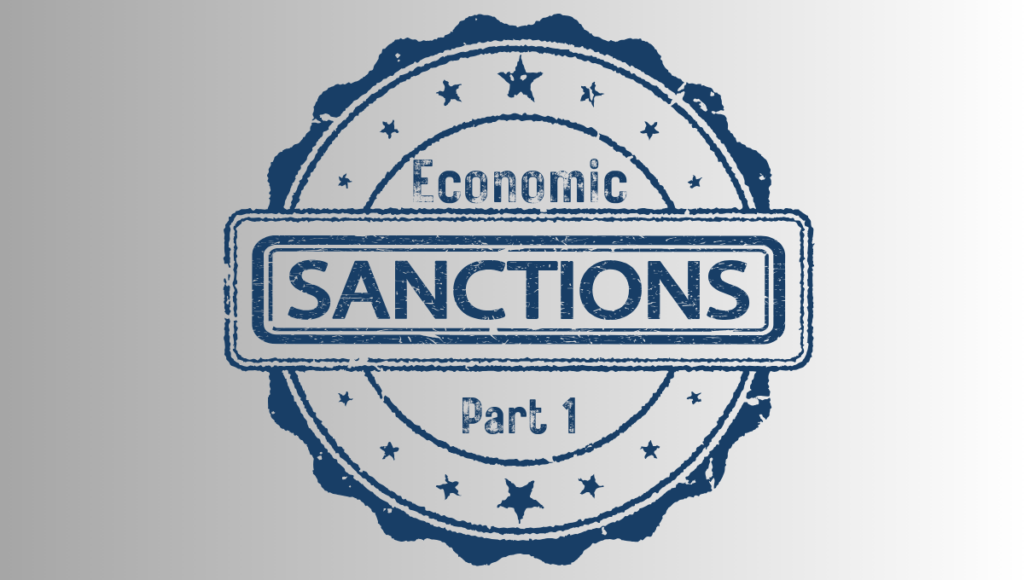Feb 21, 2024
You Need to Know About Economic Sanctions
DiligenceResources

Economic sanctions are a required diligence topic for most individuals and organizations. Are you up to date on your understanding of economic sanctions?
I know what it is like to implement policies, practical procedures and technology to comply with economic sanctions. I also know how complicated it is to implement this type of compliance whether you have a global business with multiple locations and thousands of employees or you are one person shop. But no matter what the size of your organization or the industry you need to make sure that you are doing the proper economic sanction compliance and this starts with sanction diligence.
To help, I am devoting a series of posts to providing practical sources for economic sanction information. Today’s focus is on the basics.
Why?
Why do I think this is important? Because economic sanctions are a universal topic that touches all of our businesses (this includes non profits and charities).
- Economic sanctions are increasingly used as a foreign policy tool. The number of places, individuals, transactions even things (e.g. boats) that are subject to a sanction program are growing. At the same time, an increasing number of businesses have some type of global exposure or activity, physical or online, which may give rise to the need to comply with one or more sets of sanction rules.
- By definition, most economic sanctions have broad applicability requiring both individuals and organizations to comply, in other words, no one is exempt from sanction diligence and then compliance.
- Depending on the nature of your activity you may be subject to multiple sanctions rules in multiple countries.
- Potentially there are signifiant consequences for violating economic sanctions.
- There is good information available online and it is free for users.
- Economic sanctions can and in some cases must be incorporated into technology. But not all individuals or entities need or can pay for such technology. There are circumstances in which you only need to verify that you are not involved in a region or activity that is sanctioned or that you are not working with a sanctioned person. Online resources are helpful for this level of diligence.
Definition
Economic sanctions are a series of economic based rules and prohibitions imposed by a government, supranational entity or intergovernmental entity that target a: (i) country or geographic area, (ii) government or political units or parties (iii) entity or organizations (including for example businesses, financial entities, charities) (iv) individuals, (v) groups such as terrorist organizations or drug cartels or (v) property of any of these targets.
Purpose
The purpose of the sanctions is to use economic pressure to:
- Force a political resolution to conflict or combat,
- Punish or deter a behavior such as terrorism, narcotic commerce and human rights abuses
- Promote nonproliferation or a peaceable resolution to an issue.
History
The idea of using economic pressure for political gain is not new. In fact it is ancient. For example, the Magarian Decree enacted around 432 BC was a trade embargo that prevented certain merchants from accessing the marketplace and the ports.
The more recent history of global economic sanctions is centered on the post World War I and post World War II time periods with the establishment of the League of Nations and then the United Nations. The League of Nations imposed economic sanctions prior to World War II with some success. Post World War II, the United Nations Security Council has been the entity that imposes global economic sanctions. The United Nations is granted this power under its charter and that power includes the ability to require members to implement and enforce sanctions.
In addition to global sanctions there is a history of unilateral government sanctions (meaning one country imposes sanctions on another country) and multilateral sanctions (groups of countries banding together to impose sanctions).
Types of Sanctions
The sanctions imposed vary depending the intent and the target but may include one or more of the following economic prohibitions:
- Travel bans
- Financial restrictions, including limiting the ability to bank
- Freezing assets both money and physical assets
- Prohibiting transactions
- Trade restrictions such as stopping or embargoing the purchase or sale of specified goods such as chemicals, technology or weapons
The group of sanctions that is imposed for a particular circumstances is generally referred to as a sanction program. At any given time the issuer of the sanction program is coordinating a number of programs with differing components.
Sanction programs may also include “middle grounds” meaning that certain activities, such as those connected to humanitarian relief or free expression and communication may be permitted. A program may also allow certain types of activity subject to a general license or to the grant a specific license. Again, the parameters of these exceptions, licenses and the application process will be set out in the program.
List/Lists
Most entities that have sanction programs consolidate the names and other accompanying information into what they call a “consolidated” list. They then make that consolidated list available online. These are the names of individuals, organizations, businesses, financial entities, charities and other types of entities. Even “things” may be included on the list such as specific vessels.
The online list usually:
- Has a search function that allows searching using different parameters
- Provides the ability to download the entire consolidated list to your own system so you can incorporate it into your own technology or operations
- Allows a user to also see or obtain the lists on a non-consolidated basis so they can easily relate a set of names to a particular sanctions program
- Provides a user with the ability to sign up for or subscribe to update notifications
Who is Responsible For Issuing and Enforcing Sanctions?
It depends on the type of sanctions and the entity issuing the sanction. If sanctions are imposed pursuant to a UN sanction regime, each member state has to put in place the legislation and infrastructure needed to issue, monitor and enforce sanction compliance. This means that implementing, monitoring and enforcing sanctions varies depending on choices made by the country that is legally issuing the sanction program. Also, within a country there may be multiple agencies and departments involved with sanction programs.
Penalties
Again, penalties for failure to follow a sanction programs depends on the country’s legal implementation. It is possible that penalties are civil or criminal or both depending on the violation.
Actions For Diligence
There are multiple diligence issues relating to economic sanctions including performing diligence to:
- Understand what sanctions are in place
- What sanctions apply to you and your activity
- What level of compliance is required based on the requirements, your activity, your industry
- Implement education, policy, strategy, processes and procedures for sanction compliance
- Understand and implement ongoing audit and testing
- Incorporate appropriate technology and resources
- Establish internal and external monitoring
This is a very general and basic review on the topic of sanctions. Do your diligence to understand what you need to do for your circumstance and watch for future posts that will provide sources for specific sanction lists.

Sign Up to Receive the Diligence File Emails – More Ideas & Resources to Advance Your Diligence
Thank you


Subscribe for Diligence Updates
Get the latest updates, resources, offers, and more.
"*" indicates required fields
The Diligence File respects your privacy. Privacy Policy